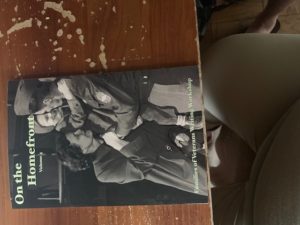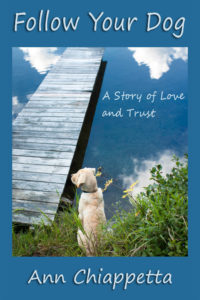This was my first workshop in, like, forever. I decided to take part in it because I felt I needed a creative challenge. I felt my story as the wife of a Navy veteran was, an as yet untapped source of creative material. I was also lucky the group met on a day when my shift at the counseling center ended early. Sure, it was a long day for me and for my guide dog, but we were both ready to meet the task with excited anticipation.
Our instructor, Julia, was the best, knowledgeable, kind and direct. The writing exercises she gave us got me writing and accessing creative content I’d either never thought was worth expanding or too emotional. I loved hearing the writing of the other three women, too; we were all so different, our experiences with veterans, while different, also kept us connected. We wrote our hearts out and I want to thank them all for each contributing to making the group a safe and empathetic place to share our feelings through writing.
Below is one of my pieces included in the anthology.
Stance
The soldier’s stance keeps him in good posture, shoulders straight, ready for action. Confidence and training come through during target practice; his body moves expertly, and he takes aim. He will serve and protect, honor his uniform and endure.
People have remarked he has a “hard stare”, often called “his stink eye,”. It is intimidating. He doesn’t miss much, green eyes scanning surroundings, sizing up others around us. Authority is hard for him to put down, it sticks to him like static-charged cellophane. He chews gum with an air of purpose, as if the goal is to get every bit of chew before discarding it.
Yet, at times, his voice sounds like an adolescent. It’s quiet, New York, and doesn’t carry far. when I hear him talk to a child or to our dogs, the tone takes on a kindness, I hear the smile in it. Strong hands that compel a violent person into handcuffs have also held a hamster, comforting the small animal as it died.
We were married in an inter-faith ceremony which took place in a reception hall. His voice quivered as he said his vows. When we danced the first dance, he whispered,
“I don’t know how to waltz,”
“Don’t worry, I’ll take the lead,” I said.
No one noticed.
Three other pieces of my writing are also in the book, Thoughts on The Storm, a narrative on the first Gulf War; The Joining, a personification essay on the harness used on a guide dog, and a poem, The Cabin, about the cabin of my youth. These pieces, along with writing from the wife of a Vietnam veteran, the sister of a Vietnam veteran, and the daughter of a WWII veteran fill this book with emotional and meaningful stories.
If you want to learn more about the VWW program and purchase copies, go here:
https://fvww.weebly.com/buy-books.html
On the Homefront: Volume 4, published June 2019, contains narratives of homes lost and homes returned to, wars played out on television, wives and mothers anxiously awaiting news about their loved ones, and what it’s like when that loved one doesn’t come home. Told from a vantage most of us never have – loving someone who is literally in the line of fire – these stories are ours; mothers, daughters, sisters and wives, loving their families and holding on. Authors: Barbara Carlson, Ann Chiappetta, Roseli D’Alessandro and Susan Perko.
Veterans Writing Workshop works to establish writing programs for the veterans’ community in Westchester County and the New York Metropolitan area. It was created as an outgrowth of a successful veterans’ writing program hosted by Fordham-Westchester University in Spring of 2010 as part of the National Endowment for the Arts’ the Big Read program. VWW consists of two major components: veterans’ community-based writing workshops held in a public space free of charge to all U.S. veterans and their family members.
Facebook page link
https://www.facebook.com/onthehomefrontfvww/

 Homefront Vol. 4 cover
Homefront Vol. 4 cover

